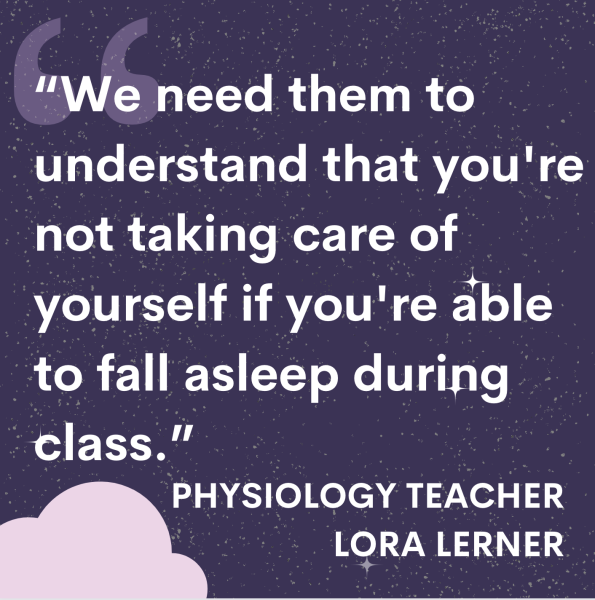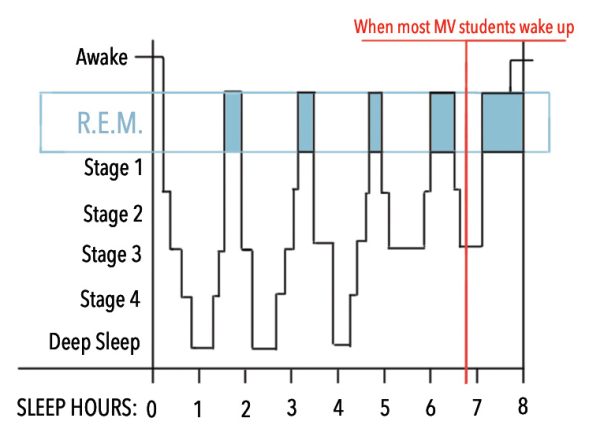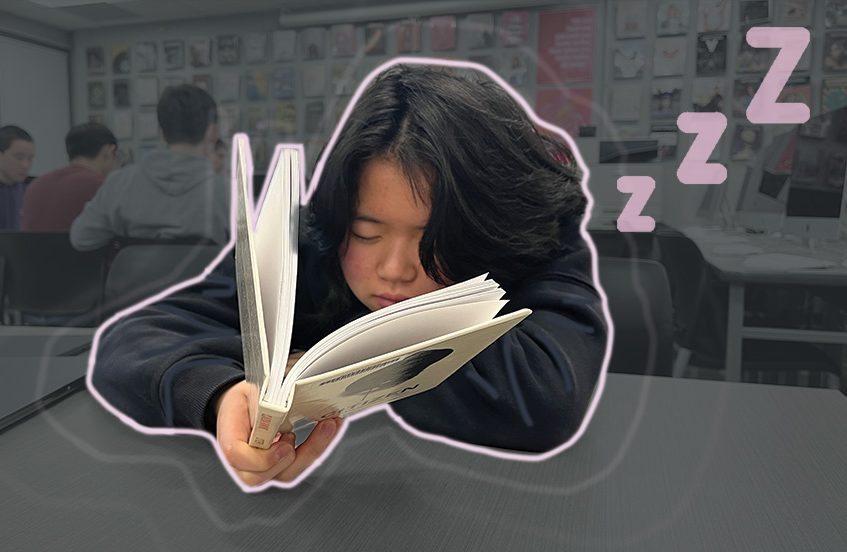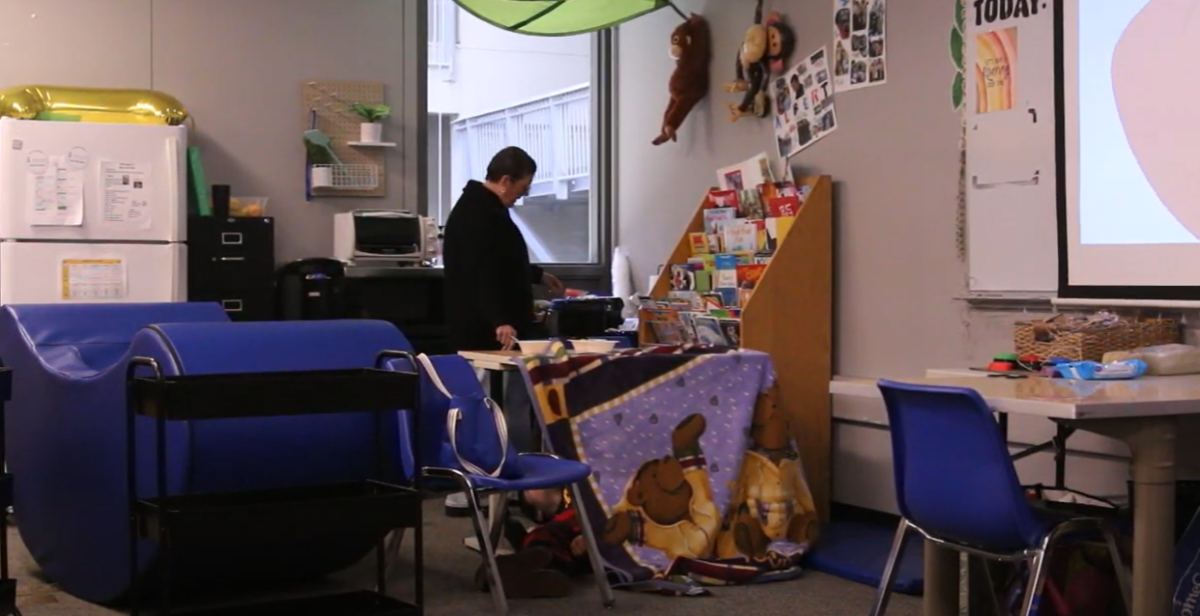Sitting in the back of her seventh-period Spanish class, junior Sravya Mikkilineni feels the familiar signs again — droopy, heavy eyes and no focus — before she falls asleep in class. Mikkilineni says this happens every other day during her Spanish class.
“One time, my teacher thought I fainted, and she started trying to call the office, but she eventually realized that I was just asleep,” Mikkilineni said. “After she just joked about it and I didn’t really get in any trouble.”
According to Physiology teacher Lora Lerner, who has experienced many students falling asleep in her class, napping is a great teachable moment for her students to realize that they are sleep-deprived. Earlier in her career, she interpreted students napping during her class as a sign that students were bored. However, after teaching a sleep unit in her Physiology class, her mentality around naps shifted.
“I still don’t like students napping during class, but I have a lot more compassion,” Lerner said. “If you can fall asleep in a room full of people in the middle of the day, I know you’re not getting enough sleep. We need them to understand that you’re not taking care of yourself if you’re able to fall asleep at that time.”
According to Healthline, more than 70% of all teens are sleep-deprived, meaning they are getting less than the recommended eight to 10 hours of sleep per night. The main cause – hormonal changes – naturally inclines teenagers to go to sleep late and wake up later. However, early school start times prevent students from sleeping in and can lead to eventual sleep deprivation.
Lerner notes that she sees drastic differences in sleep schedules between her freshman students and her junior and senior students. Many of her freshmen can still fall asleep around 10 p.m., while many of her older students do not even get tired until midnight or later.
Junior Naoka Baba also falls asleep in her classes due to a lack of sleep, especially when watching documentaries or lectures that don’t require active participation. To combat this, she tried chewing gum during class to keep herself occupied, even consuming an entire pack of gum per day — until she accidentally fell asleep and swallowed her gum. Although she believes her lack of sleep is a problem, she feels that she hasn’t missed any important information while napping.
“I figured out when I need to pay attention and when I don’t need to pay attention,” Baba said. “I feel like I’m not stupid enough to nap when something important is happening.”

However, despite believing that napping in class may indicate a lack of sleep, Mikkilineni and Baba both believe that napping also has some advantages. Mikkilineni says that after taking a short nap in class, she feels better and can focus better. Baba agrees and believes that naps come with many benefits.
“I feel less inclined to ditch class because I know I can sleep in it, so my attendance is improving,” Baba said. “Sleeping in the library is really embarrassing. But sometimes I also feel really mad or annoyed. Then I take a nap and I feel happy.”
Both Baba and Mikkilineni get around five hours of sleep per night, which Baba believes is average for the typical MVHS student. Due to extracurriculars, jobs and a large amount of homework, both go to sleep late and wake up early.
Although this trend is common among teenagers due to their natural late bedtime, waking up early cuts off Rapid Eye Movement (REM) sleep — the stage of sleep where dreams occur, the brain processes information from the day and regulates emotions.
“The problem is most of your REM sleep is during the last third of the night,” Lerner said. “So if you’re constantly cutting that short, learning is obviously going to be pretty poor. You’re also less likely to remember content later if you don’t get that time for your brain to process.”

MVHS pushed its start times to 8:30 a.m. from the earlier 7:30 a.m. two years ago to address sleep deprivation and comply with the Senate Bill 328 which enforced an 8:30 a.m. start time for high schools. With the potential for the new eight-period schedule for next school year, the start time would be even later on Wednesdays, which would start at 9 a.m.
Although Baba would welcome the added sleep time on Wednesdays, she doesn’t believe the eight-period schedule would impact her sleep, because the problem lies more with time management rather than the school’s schedule. Lerner echoes Baba’s opinion and also believes that the eight-period schedule could potentially cause more stress due to shorter class times, hurting students’ quality and quantity of sleep.
“Our curriculums aren’t just going to automatically get shorter,” Lerner said. “Courses are going to have to push more on the students because we’ll have less class time. I think having less class time is not going to help any of our situations we’re trying to address around stress and sleep.”
However, Mikkilineni is looking forward to the eight-period schedule, as she says she’ll have more free periods due to her lighter course load as a senior. She also believes that it will help her nap in class less.
“I just like the fact that the class periods will be slightly shorter,” Mikkilineni said. “It’ll be easier to focus more in each period rather than focusing for a long period of time in one period.”
Regardless of the new schedule, Lerner emphasizes the importance of finding a natural sleep schedule and staying consistent. She also believes that to have a better sleep schedule, the only solution is good time management.
“Work your schedule around your natural sleep schedule because your body’s probably not going to change,” Lerner said. “Try to work it around what your body wants to do, and prioritize sleep. It’s so easy to make that a lower priority, and we pay the price if we do.”























